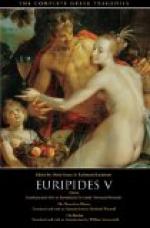Homer had long since told the story, as he tells so many, simply and grandly, without moral questioning and without intensity. The atmosphere is heroic. It is all a blood-feud between chieftains, in which Orestes, after seven years, succeeds in slaying his foe Aegisthus, who had killed his father. He probably killed his mother also; but we are not directly told so. His sister may have helped him, and he may possibly have gone mad afterwards; but these painful issues are kept determinedly in the shade.
Somewhat surprisingly, Sophocles, although by his time Electra and Clytemnestra had become leading figures in the story and the mother-murder its essential climax, preserves a very similar atmosphere. His tragedy is enthusiastically praised by Schlegel for “the celestial purity, the fresh breath of life and youth, that is diffused over so dreadful a subject.” “Everything dark and ominous is avoided. Orestes enjoys the fulness of health and strength. He is beset neither with doubts nor stings of conscience.” Especially laudable is the “austerity” with which Aegisthus is driven into the house to receive, according to Schlegel, a specially ignominious death!
This combination of matricide and good spirits, however satisfactory to the determined classicist, will probably strike most intelligent readers as a little curious, and even, if one may use the word at all in connection with so powerful a play, undramatic. It becomes intelligible as soon as we observe that Sophocles was deliberately seeking what he regarded as an archaic or “Homeric” style (cf. Jebb, Introd. p. xli.); and this archaism, in its turn, seems to me best explained as a conscious reaction against Euripides’ searching and unconventional treatment of the same subject (cf. Wilamowitz in Hermes, xviii. pp. 214 ff.). In the result Sophocles is not only more “classical” than Euripides; he is more primitive by far than Aeschylus.
For Aeschylus, though steeped in the glory of the world of legend, would not lightly accept its judgment upon religious and moral questions, and above all would not, in that region, play at make-believe. He would not elude the horror of this story by simply not mentioning it, like Homer, or by pretending that an evil act was a good one, like Sophocles. He faces the horror; realises it; and tries to surmount it on the sweep of a great wave of religious emotion. The mother-murder, even if done by a god’s command, is a sin; a sin to be expiated by unfathomable suffering. Yet, since the god cannot have commanded evil, it is a duty also. It is a sin that must be committed.
Euripides, here as often, represents intellectually the thought of Aeschylus carried a step further. He faced the problem just as Aeschylus did, and as Sophocles did not. But the solution offered by Aeschylus did not satisfy him. It cannot, in its actual details, satisfy any one. To him the mother-murder—like most acts of revenge, but more than most—was a sin and a horror. Therefore it should not have been committed; and the god who enjoined it did command evil, as he had done in a hundred other cases! He is no god of light; he is only a demon of old superstition, acting, among other influences, upon a sore-beset man, and driving him towards a miscalled duty, the horror of which, when done, will unseat his reason.




